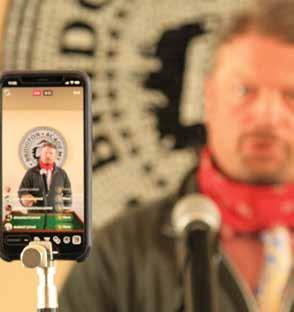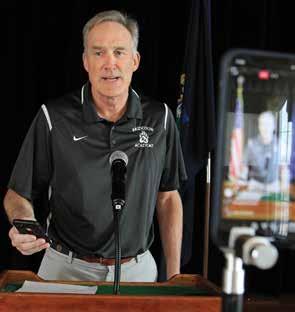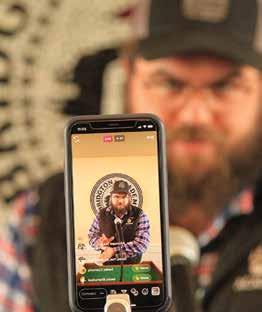
7 minute read
Wolverines at Home: Learning and Growing Amidst the Pandemic
The first week of March in North Bridgton witnessed a palpable excitement in the air as students prepared to go home for their much-anticipated spring break. For some, that meant traveling to warmer climates; for others, just being at home and spending time with family and friends was the top priority. As Friday of that week dawned and students made a mass exodus from campus, no one would have imagined what reality would look like just seventeen days later.
All too suddenly, Maine was in a state of emergency, campus was forced to close, faculty were working from home, and the leadership of the Academy was faced with making a decision about how to turn on a dime and best provide a meaningful Bridgton education to our students remotely. For over two centuries, Bridgton Academy has weathered many storms and come out stronger on the other side. But, like the rest of the country, life had, in many ways, been turned upside down.
Advertisement




In the face of uncertainty, Bridgton’s teachers rolled up their sleeves and worked tirelessly over their own vacation. Even though these were waters that the Academy had not previously navigated, staff jumped in wholeheartedly, striving to offer the best distance learning program possible. Ms. Binaca Hanson, Dean of Academics, reported to faculty the night before students embarked on this new venture: “We have had people in dorms getting things from rooms and mailing them to students so they are ready; folks have tried ’pilot’ Focused Academic Coaching sessions to see how these will feel via FaceTime; College Counseling has redesigned all of what they do to make it work remotely; we have professionals ready to reach out and support those who aren’t as engaged as we need them to be; and our teachers have stood ’virtually’ shoulder to shoulder to make sure no one feels alone in addressing how we move forward…. We are about to show our students why, even when we aren’t right there, we are still right here, doing our very best.”
The very first day of remote learning kicked off with a live Chapel presentation. This new venture of taking classes off campus served more or less as a crash course for students. As the majority of our young men had never studied in this way, there was comfort in beginning this time with the familiarity of a Chapel assembly led by Mr. Mooney. His words hearkened back to their first day of classes in September and provided an encouraging message to the students that, once again, they could do this.
Ms. Amity Gottschalk, the Academy’s Director of Academic Support, was busier than ever running the Focused Academic Coaching (FAC) program from afar. Through continued weekly meetings, which were held remotely via FaceTime, the majority of students who signed up for FAC at the start of their academic year remained “super participatory,” reported Ms. Gottschalk. However, as the days and weeks unfolded, she recognized in both herself and her students a level of grief— grief over not being able to experience everything the fourth quarter on campus typically offers, as well as sadness over what felt like such an abrupt end to life on the hill in North Bridgton. Yet despite their sadness, the thirty-five young men enrolled in FAC were learning a whole new set of real-life
skills that they would not have otherwise learned on campus. For Ms. Gottschalk, who also teaches Introduction to Film Analysis, the shift to off-campus learning meant that she needed to get creative and be sure every film her students were required to watch for that class was readily available. Her fourth quarter syllabus was dramatically adjusted. No longer was there time to pause a film and delve into discussion; instead students were asked to further develop their writing through individual film analysis. Despite the challenges that distance learning presented, which in some cases even meant ensuring that students had reliable WiFi, Gottschalk felt that it magnified the many positive things Bridgton offers, such as the relationships forged between students and the adults on campus and truly defining the personalized instruction available at Bridgton Academy.
One of Bridgton’s math teachers, Mr. Jeremy Muench, transitioned from his typical class structure of students’ mandatory attendance at every class period to essentially making class attendance optional. All required class materials were posted online twice a week for students. If they felt as though they needed additional help, the two or three optional class blocks with instruction were also posted, as well as a private Zoom channel that provided students access to Mr. Muench throughout the academic day. Mr. Muench reflects that although remote learning was not the easiest situation, there were some


unexpected positive results. With the inability to do things conventionally in distance learning, Muench used the time to try something new he had previously only contemplated. This year, as a portion of the final exam, he conducted a 20-minute interview with each one of his math students—in classes ranging from Calculus I to Multivariable Calculus—to determine how they handled solving math problems, thereby demonstrating a true understanding of the concepts taught to them over the year. If pleased with the outcome of these interviews, he may actually implement this testing method in future years, even after returning to more traditional classroom instruction. Muench feels strongly that for some students, this challenging time of learning only served to reinforce the same commitment that brought them to Bridgton in the first place.
Seen through the eyes of our recent graduates, their true Bridgton year was “cut short” due to COVID-19. As students were completing their final assignments and preparing for exams, Jake Egan ’20 submit ted a narrative essay for his English class with Mr. Dube, in which he further shared, “As much as I got annoyed being stuck [at Bridgton] sometimes, I sure do miss it now … compared to last summer, I am working out like an animal right now. Compared to last school year, I am studying and com pleting work like never before. Bridgton Academy bettered me in many aspects, and I definitely see it a lot more now.”
Ms. Hanson typically shares a message with each class of Bridgton students at the end of the year. In that spirit, we close with her thoughts on this time of remote learning for the Class of 2020: “The last seven weeks provided a great deal of uncertainty for our students and our faculty. It’s easy to name what we missed: seeing that last bit of bonding among the students, the last games of an exciting athletic year, high-fives for jobs well done. We missed watching the guys appreciate the sun shining and the birds chirping after a snowy winter. And yet, somehow, we did the work that we would have done if we were all here on campus. Discussions were held, research was done, classes were completed, and finals were taken. Teachers found ways to connect and laugh with their students. Students found the courage to ask for help via text and email that they may not have found otherwise. None of this is how we wish the 2019-2020 school year ended, and yet, each of us did what we had to.”
She continues, “When I had a Zoom call with the valedictorian candidates, I shared I was sad to not be able to tell them in person and give them a hug. One of the young men remarked that, while this was a different way than he anticipated being notified, it didn’t make it any less sweet. As I walked a quiet campus after that call, that’s what stuck with me: not that the year was imperfect, but that Bridgton, with all its magic, found a way to be Bridgton.” BA








